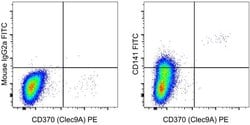Learn More
Invitrogen™ CD141 Monoclonal Antibody (JAA17), FITC, eBioscience™, Invitrogen™

Description
This JAA17 monoclonal antibody recognizes human CD141 also known as thrombomodulin, fetomodulin, or BDCA-3. CD141 is a type I membrane receptor that binds and allosterically activates thrombin. The resulting complex cleaves protein C and the Thrombin Activatable Fibrinolysis Inhibitor (TAFI), initiating an important anticoagulant and anti-fibrinolytic pathway. Soluble thrombomodulin is constitutively present in the serum at a very low level and can be upregulated during inflammation. The anti-inflammatory activity of thrombomodulin results from its ability to block the highly pro-inflammatory activity of thrombin. Thrombomodulin prevents chemotaxis and binding of granulocytes to activated endothelium and inhibits activation of eosinophils and mast cells thereby reducing inflammation. Mutations in the CD141 gene result in thromboembolic disease, also known as inherited thrombophilia. Although expressed across many tissues and cell types, its highest expression has been reported on the luminal surface of vascular endothelial cell. In the immune system the highest expression can be observed on myeloid cells, including dendritic cells, macrophages and blood monocytes. In humans, CD141 is commonly used as a marker of cross-presenting dendritic cells in both lymphoid and non-lymphoid tissues. Retinoic acid has been shown to upregulate CD141 expression on human monocyte-derived dendritic cells and primary human dendritic cells.

Specifications
Specifications
| Antigen | CD141 |
| Applications | Flow Cytometry |
| Classification | Monoclonal |
| Clone | JAA17 |
| Concentration | 5 μL/Test |
| Conjugate | FITC |
| Formulation | PBS with BSA and 0.09% sodium azide |
| Gene | THBD |
| Gene Accession No. | P07204 |
| Gene Alias | AHUS6; AI385582; BDCA3; BDCA-3; CD141; CD141 antigen; DC141; fetomodulin; sCD141; snoRNA MBII-339; soluble CD141; THBD; THPH12; THRM; thrombomdulin; thrombomodulin; thrombomodulin precursor; TM |
| Show More |
For Research Use Only
By clicking Submit, you acknowledge that you may be contacted by Fisher Scientific in regards to the feedback you have provided in this form. We will not share your information for any other purposes. All contact information provided shall also be maintained in accordance with our Privacy Policy.


